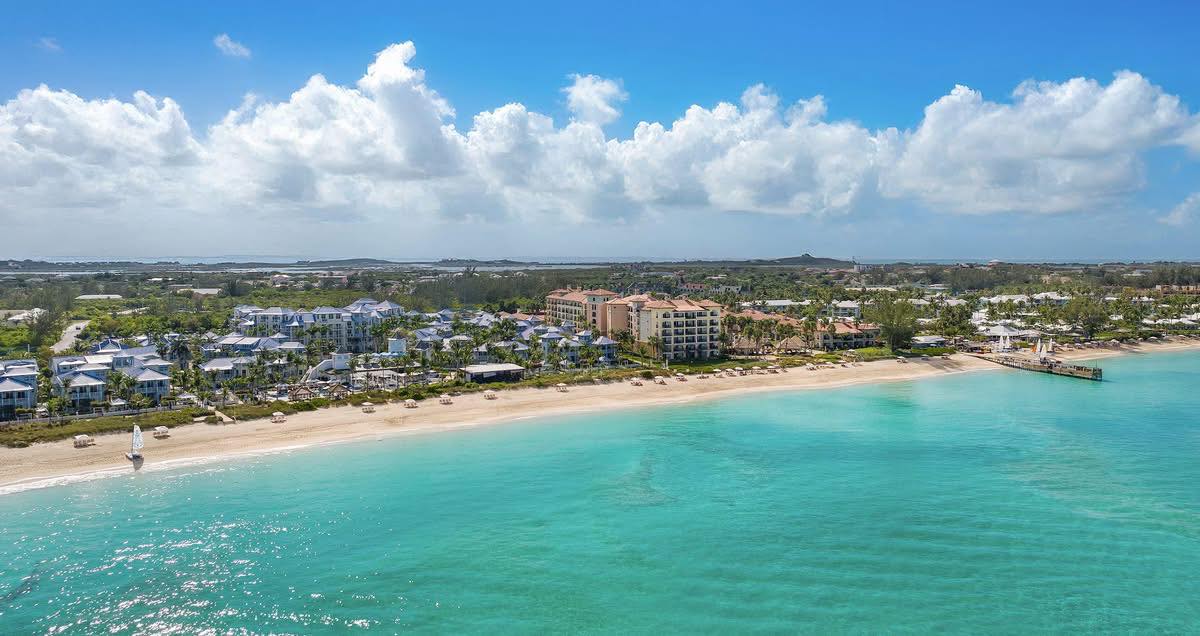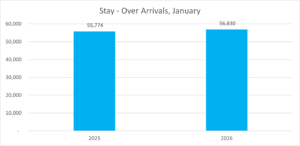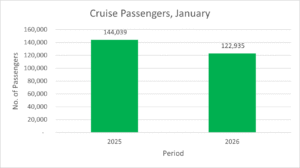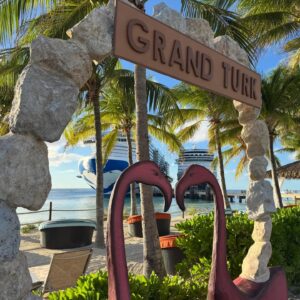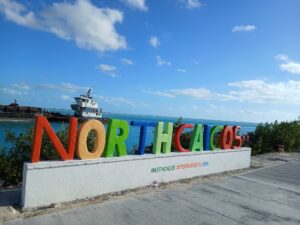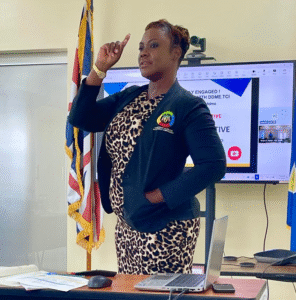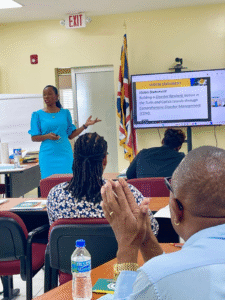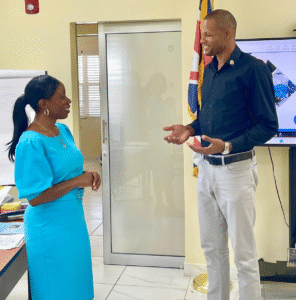Deandrea Hamilton
Editor
Turks and Caicos, January 26, 2024 – When men of the People’s Democratic Movement sat down to speak to the party’s national chairman in a live streamed show on January 20, there were several solutions put forth, with the early part of the two hour production focused on illegal migration, traffic congestion, development of the education system and allotting millions more for youth development through scholarships and grants.
Ezra Taylor, PDM National Chairman led the discussion which featured: Edwin Astwood, PDM Party Leader and incumbent for ED2; Robert Been, PDM Deputy Party Leader and All Island Candidate; Sean Astwood, All Island Candidate; Dwayne Taylor, All Islands Candidate; Ralph Higgs, All Island Candidate; Temard Butterfield, All Island Candidate and Alvin Garland, All Island Candidate.
ILLEGAL MIGRATION
“Our borders are weak, our resources are overwhelmed and we are stretched thin.”
Alvin Garland, who served as a PDM appointed member to the House of Assembly is now running at large. He believes a modernised system will improve detection.
“This is a very serious topic for the Turks and Caicos Islands, and we have seen illegal sloops continue to frequent our borders without being able to be detected. Illegal migration is not just an immigration issue, it is a national security issue, it is an economic issue and it is a community issue.”
The PDM wants “a biometric system, whereby we can detect or have a record of every individual that comes into the Turks and Caicos Islands. We will also be introducing what we will need to stop the illegal trafficking.”
A former immigration minister, Sean Astwood, who will run for one of nine at large or all island seats had some insightful comments.
“We’re taking a serious approach. We’re no longer waiting on the British Government to protect our borders for us, while we will continue to liaise with them and get assistance from them, the Turks and Caicos Islands for the first time is going to be taking a progressive approach where we own the situation and we put the resources behind it.”
Astwood said the posture of the PDM will move away from dependency to autonomy on the issue, with resources firmly committed.
“It is time we as a country, we say we want to be a nation, we want to determine where we go as a country, it’s time that we take responsibility and protect our borders. We will spare no expense. We are going to be putting in a full marine base, like we say, with the new technology, we want to increase the radar coverage, we’re going to make sure everyone in this country, we know who they are through fingerprinting.”
Mass raids are also coming with the help of a dedicated team of officers. Under the PDM, there will be a return of SPICE or a squad with that function.
“We are gonna conduct mass raids. We are gonna make sure that we comb this country, that everybody who is here, is supposed to be here and is here legally,” said Sean Astwood.
While Mr. Garland pointed to areas like construction sites, where unskilled illegal migrants are benefitting from the jobs created due to the current boom in the industry, he was tasked with talking about the action the PDM plans to take about jobs being doled out “illegally” in the corporate space.
“We will reform the current policy to better the interest of our people. When you are renewing a work permit, particularly for skilled workers in the corporate sector or applying for a new work permit, you will first have to submit it to the Labour department six weeks prior, that will give the Labour Department some time to identify a qualified applicant.”
The PDM plans to phase out the policy which only required proof that the position had been advertised.
Garland, who is an attorney, said Islanders no longer have faith in the current process and therefore no longer apply for the advertised jobs, suspecting that the position has already been assigned to someone else who is often an expat worker.
Ralph Higgs, another former member of parliament and former tourism minister for the Turks and Caicos Islands, also wants to introduce the technology which will flag individuals who overstay in the islands.
TRAFFIC CONGESTION
Alternative roads, traffic lights and traffic cops all factor into the PDM’s plan to end the gridlock motorists face in their morning and afternoon commutes on the main island of Providenciales.
Sean Astwood is an all-island candidate in the upcoming General Elections and he said the party will also focus on public transportation.
“We are going to tackle the illegal jitney problem. To make sure we put in place public transportation where our citizens are going to be carried back and forth – from home to work, school – through safe transportation methods that will decrease the amount of vehicles on the street and help to reduce traffic congestion.”
The PDM’s men participating in the fireside chat expressed deep concern about the danger of the illegal jitney system, with reports of sexual assaults escalating last year which resulted in the launch of two safety campaigns aimed at ensuring residents of and guests to the islands avoid the use of the unlicensed cars.
“We will tackle this seriously, it will not only create businesses for our people but we have already looked at alternative roads especially out of Blue Hills and Wheeland that can get straight down town, straight to the airport,” said Edwin Astwood, the party’s leader and ED 2 incumbent.
The plans, he said, also extend to the eastern end of Providenciales.
EDUCATION & YOUTH
When it comes to Education, the PDM wants to assess the current systems.
“First of all we need to review our curricula, to ensure that we are meeting the national needs of our countries dn providing our students with the best education there is. We want to prepare them to be national leaders in our country and in doing so, we want to ensure that we add elements of financial literacy and other skills based training that will promote them and propel them into being model citizens in our country,” said Temard Butterfield, All Island Candidate.
Butterfield, an educator himself, pointed to qualified certifications at a Technical and Vocational school, and reminded that “special needs is at the core and the heart of our manifesto and our agenda”.
is at the core and the heart of our manifesto and our agenda”.
Sports is important to the PDM Agenda, offered Mr. Butterfield, with a focus on upgrading and expanding sporting facilities. Scholarships was another area the PDM believes needs attention.
“Expand scholarship opportunities. We cannot forget that. If you have a dream, if our Turks and Caicos Islands Community College is not offering it – and yes we want to ensure that we upgrade our college so that we can have our first Turks and Caicos Islands National University – but we want to ensure that we provide our young men and our young women with all the opportunities to qualify themselves and to be model citizens of this country.”
Youth development is also central to the PDM, explained Robert Been, an all-island contender and the PDM’s Deputy Party Leader.
“We intend to initiate a youth development fund geared toward those young entrepreneurs that want to get that exposure to get those business start ups off the ground. For Youths that want to invest in careers that’s outside the curriculum. So that fund will be a different fund from the current scholarship fund…” said Been.
Piggy-backing on his deputy’s comments about the increase in scholarship funding to $12 million, Edwin Astwood agreed there is a need to double the allotment.
“That is four times the current level. Within that $12 million, as the deputy pointed out for those of you who do not want to follow the scholar’s way, you want to leave high school and go straight into a business, so you can get a grant right out of high school.”
The grant will support training for those school leavers for the best possible outcomes, said the leader.



 News4 days ago
News4 days ago
 News1 week ago
News1 week ago
 Caribbean News5 days ago
Caribbean News5 days ago
 News4 days ago
News4 days ago














